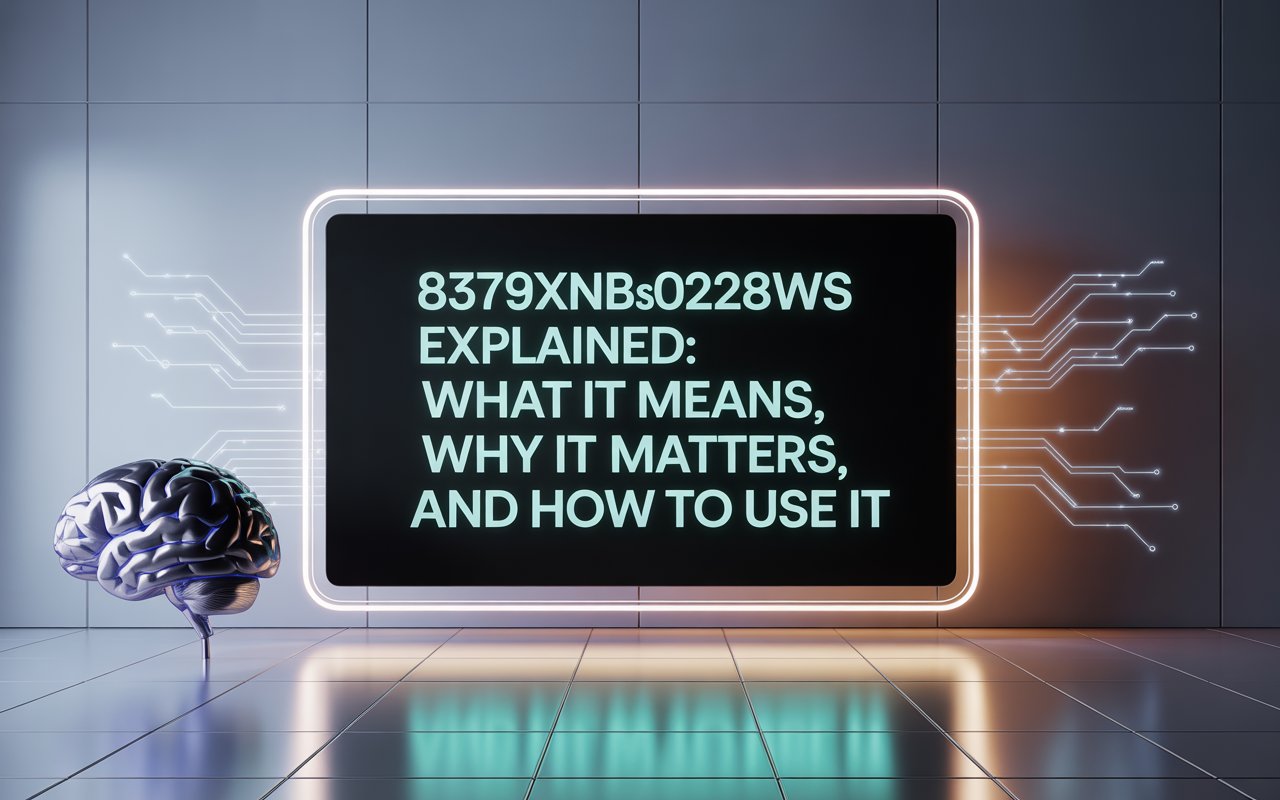Introduction
At first sight, 8379xnbs8e02328ws seems like a meaningless mix of letters and numbers. Yet, this cryptic sequence has an important role in today’s digital ecosystem. In reality, 8379xnbs8e02328ws functions as a unique machine-generated identifier that allows systems to manage data securely, authenticate users, and prevent predictable patterns that attackers might exploit.
From web applications to cloud platforms, identifiers like 8379xnbs8e02328ws quietly ensure smooth operations. They may not look human-friendly, but they carry significant technical value. In this article, we’ll break down what 8379xnbs8e02328ws is, why such codes exist, where you’ll encounter them, their security implications, and how to handle them safely.
What Is 8379xnbs8e02328ws?
The string 8379xnbs8e02328ws is an alphanumeric token, a sequence generated by algorithms to serve as a unique, non-repeating identifier. It is not meant to carry meaning for humans. Instead, it provides machines with a way to reference data, track processes, and authenticate actions without exposing sensitive details.
Think of 8379xnbs8e02328ws as the equivalent of a digital fingerprint. Every string is different, each one acts as a private tag, and no two are identical. Unlike a predictable user ID like user1001, this sequence resists guesswork, giving systems a stronger security layer.
Why Codes Like 8379xnbs8e02328ws Exist
The internet thrives on identifiers. Without them, computers wouldn’t know which file belongs to which user or which transaction belongs in which account. Random codes such as 8379xnbs8e02328ws provide the following advantages:
1. Security Enhancement
Randomized tokens reduce the risk of brute-force attacks because they don’t follow logical, sequential patterns.
2. Unique Reference Points
With billions of users online, identifiers like 8379xnbs8e02328ws ensure that no two sessions or files collide.
3. Scalability Across Systems
Large-scale services, such as cloud providers, can generate countless unique identifiers instantly without conflict.
4. Compliance with Privacy Laws
Instead of exposing personal data in links or APIs, companies embed secure codes like 8379xnbs8e02328ws.
5. Developer Efficiency
For engineers, these codes simplify backend tracking, error logging, and data organization.
Where You Might Encounter 8379xnbs8e02328ws
Even if you don’t recognize it, you’ve likely interacted with codes similar to 8379xnbs8e02328ws countless times.
- Website URLs – Secure login or session tracking links often embed random tokens.
- Cloud File Sharing – Platforms such as Dropbox or Google Drive use similar codes to create unguessable links.
- Password Reset Emails – Verification tokens are structured like 8379xnbs8e02328ws.
- App Session Tokens – Mobile and web apps generate them for each active user.
- Analytics & Logs – Developers use identifiers like 8379xnbs8e02328ws for tracing events privately.
Security and Privacy Implications
The presence of 8379xnbs8e02328ws itself is not harmful. What matters is the context in which it appears.
- ✅ Safe Scenario: You request a password reset and receive a link containing 8379xnbs8e02328ws.
- ⚠️ Caution Needed: The string appears in an unsolicited email urging immediate action.
- ❌ Risky: It’s used in a suspicious link that redirects to unknown websites.
The keyword takeaway is this: 8379xnbs8e02328ws is safe in legitimate environments, but you should always verify the source before interacting with it.
Why Codes Like 8379xnbs8e02328ws Are Becoming Common
Several trends explain why identifiers like 8379xnbs8e02328ws are showing up more often:
- Data Privacy Movement – Companies hide user details behind randomized codes.
- Cloud Expansion – File-sharing and collaboration rely heavily on unique identifiers.
- User Growth – More people online requires more identifiers to avoid conflicts.
- Exclusive Access Marketing – Businesses and influencers use unique codes to unlock hidden offers or content.
Real-World Applications of 8379xnbs8e02328ws
In Finance
Banks rely on unique tokens like 8379xnbs8e02328ws for transaction verification, ensuring that each operation is securely tagged.
In Healthcare
Medical systems anonymize patients with random identifiers rather than exposing personal data.
In E-Commerce
Order tracking links and digital receipts often embed randomized sequences.
In Social Platforms
Private links to content—such as unlisted videos or invite-only events—are built using identifiers like 8379xnbs8e02328ws.
In Cloud Infrastructure
APIs, servers, and storage buckets all rely on such identifiers to maintain separation and organization.
Best Practices When Dealing with 8379xnbs8e02328ws
For Users
- Always check if the identifier comes from a trusted service.
- Do not click on links containing 8379xnbs8e02328ws if you didn’t request them.
- Keep devices protected with updated security tools.
For Developers
- Use cryptographically strong random generators for codes.
- Limit the validity period of tokens like 8379xnbs8e02328ws.
- Monitor logs to detect suspicious activity.
- Avoid embedding personal data directly into identifiers.
FAQs
1. What does 8379xnbs8e02328ws mean?
It’s a random identifier generated to uniquely and securely reference something in a system.
2. Is 8379xnbs8e02328ws dangerous by itself?
No, the string alone is harmless. Risk depends on its source and context.
3. Why not use simple IDs?
Predictable IDs are easier to guess and exploit. Random ones are safer and more scalable.
4. Can I generate my own codes like 8379xnbs8e02328ws?
Yes, developers use libraries and algorithms to create such identifiers.
5. Where else do these appear?
In cloud links, verification emails, secure app sessions, and backend records.
The Future of Identifiers Like 8379xnbs8e02328ws
As technology advances, identifiers will evolve. With blockchain, Web3, and AI-driven systems, random tokens like 8379xnbs8e02328ws will gain new importance in digital identity, smart contracts, and secure decentralized applications.
Expect them to become longer, more complex, and embedded with multi-layered cryptographic protections to ensure resilience in an ever-expanding digital ecosystem.
Conclusion
Though it may appear meaningless at first, 8379xnbs8e02328ws is far from random nonsense. It is a critical building block of digital infrastructure. From securing accounts to organizing massive systems, this identifier plays a role in privacy, scalability, and safety.
The next time you encounter 8379xnbs8e02328ws, remember: it’s not just a jumble of characters—it’s a sophisticated safeguard working behind the scenes. Handle it wisely, trust it only from reliable sources, and appreciate the silent order it brings to the vast, chaotic web.


